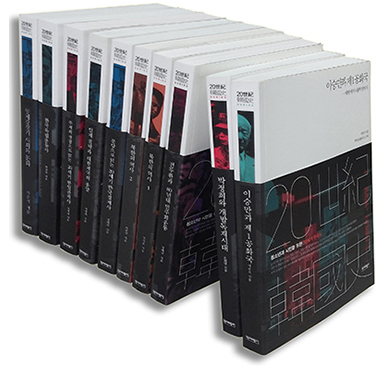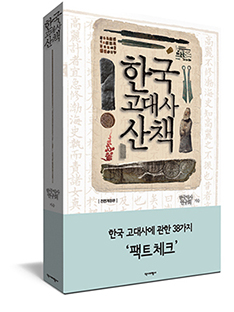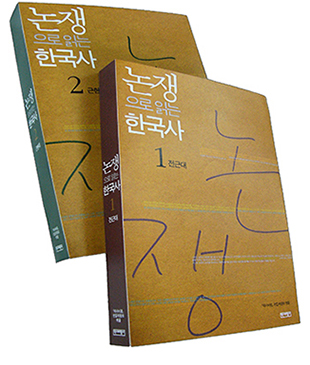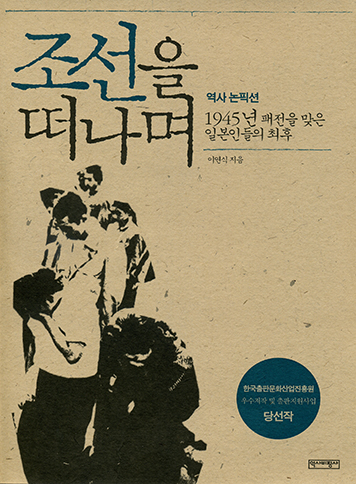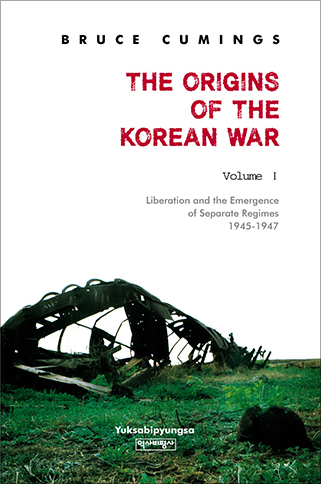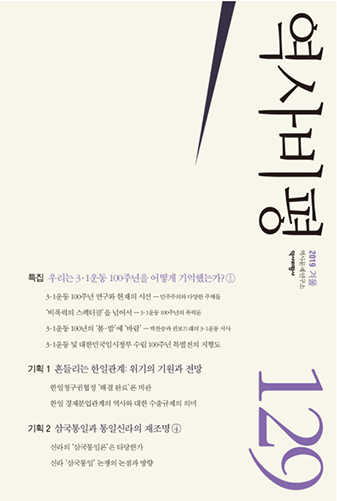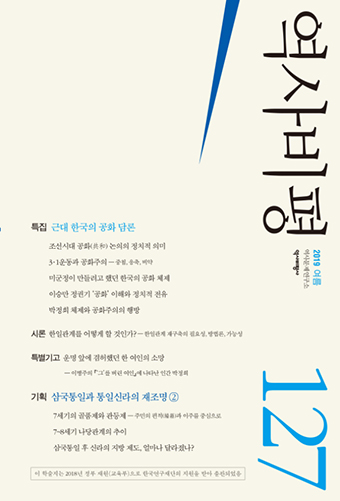|
Yuksabipyoungsa Engraving the meaning of historical record upon the mind
2020.09.07
Yuksabipyoungsa is an unrivaled publisher specialized in history in Korea. Established in 1987 with a “bookazine” Critical Review of History, it has been devoted to publishing content on Korean history for more than 30 years. From the glorious days to heart-numbing moments, the publisher has been producing rough but calmly written history works. Following is the interview with Yuksabipyoungsa, who honestly talks about our yesterday, today, and tomorrow.
Logo of Yuksabipyoungsa
Please introduce us about Yuksabipyoungsa.
“Yuksabipyoungsa pursues building a live history in harmony with the changing society.”
Yuksabipyoungsa pursues the publishing of books for better historical development.
Please introduce our readers of K-Book Trends the representative works of Yuksabipyoungsa.
We would like to recommend the Korean History in the 20th Century series composed of 10 volumes. It is a popular liberal arts series that talks about the period beginning from when Korea first opened its port to foreign countries, to the democratic movement in 1987 by topics and generations. Based on the opinions of the most authoritative experts and materials in each field, the series about modern and contemporary history takes the most objective standpoint with no political bias at all.
Korean History in the 20th Century, Take a walk in ancient Korean history, Reading Korean History by Argument
Are works of Yuksabipyoungsa popular in other countries too?
Yuksabipyoungsa is specialized in Korean history. From the viewpoint of world history, Korean history takes a small part in the overall Eastern history, which therefore lacks attention or in-depth research across the world. Also, as history is generally interpreted and described country-centered, if each country’s history does not work in mesh with that of neighboring countries, then it loses universality. Therefore, unlike creative works like literature, the historic content of a certain country has no means but has limits in exporting copyright. However, the number of people majoring in Korean is increasing in East Asian countries like Japan and China, and also in the US, and more Korean residents abroad are finding their identity, and people are paying more attention to Korean history.
Which books did Yuksabipyoungsa export?
The first example would be The Origins Of The Korean War by prominent scholar and expert on the Korean peninsula, Bruce Cumings. It is surely a masterpiece book covering the Korean War. While it is a 1,600-page-long book first printed by Princeton University, its publication was banned in Korea for ideological reasons regardless of being appraised as the most accurate and authoritative research book, which made people sell a pirated translation of the book. Currently, the copyright for the English version is owned by Yuksabipyoungsa, and the English edition sold across the world including on Amazon is also published by the company. In China, the translated edition of How Did We Live the Past Century (百年韓囯-生活与文化) covering the 100-year modern and contemporary history of Korea is published, while Raiding the Cholera Joseon (コレラ、朝鮮を襲う-身体と医学の朝鮮史), Liberation Movement and Towards Unification (朝鮮民族解放運動の歴史-平和的統一への模索), and Leaving Joseon (朝鮮引揚げと日本人-加害と被害の記憶を超えて) are translated and published in Japan.
Leaving Joseon, The Origins Of The Korean War
Trustworthy contents are like life for a history-specialized publisher.
What is the standard and value of Yuksabipyoungsa when it comes to choosing an author or a work?
The first thing we take into consideration when selecting an author or work is the “specialty” of the author and “freshness” of the topic. We don’t call people writing history books an “author.” It is because history description is not a realm of creativity that relies on imagination. Imagination, in this field, is an element with the minimum influence that supplements the missing gap between historic materials with reasonable inference. So we are not looking for someone with a diploma, but someone that has done a sufficient amount of research and study based on our own standard. How well the writer describes this professional field comes next. Then we would be able to maintain readers’ trust for our contents as trust is like life for a history-specialized publisher like us.
Quarterly Critical Review of History
This year is the 30th anniversary of the quarterly journal Critical Review of History. How do you feel, looking back the past 30 years?
The quarterly journal Critical Review of History is a journal published by the Institute for Korean Historical Studies first published in 1987 by various critical intellectuals who agreed for the necessity of history education as Korea was undergoing democratization. If we count from the prep volume published in 1988, this is the 32nd year. The journal contributed to expanding the influence of historical studies into the public through active exchange with the public. Today, professional researchers across fields of Korean history, Western history, and Eastern history are carrying out editing meetings each month as an editing committee together with our publishers; not only profound thesis papers on history but also essays and critics are added to the journal as well.
Could you please tell us the future plans of Yuksabipyoungsa?
History is never fixed. It changes, develops, and deepens with ceaseless research and discussions. Even though Yuksabipyoungsa was established a century ago, we will present outcomes of new historical studies with such nature of history in mind. We may lack a bit of color compared to big publishers or newly established modern and sensitive publishers, but we pursue making sincere history books that do not distort the flavor of their materials. Our principle to make books that readers can have trust in and undoubtedly digest the content, albeit criticizing will stay firm with time and changing generations.
Website www.yukbi.com
Organized by Lee Ji-Hyeon
|
Pre Megazine
-

Jakkajungsin Publishing Co.
VOL.69
2024.04 -

Writer Yun Jung-Eun
VOL.69
2024.04 -

Jumping Books Publishing House
VOL.68
2024.03 -

Writer Kim Hwa-Jin
VOL.68
2024.03 -

Publisher Hyohyung
VOL.67
2024.02 -

Writer Minha
VOL.67
2024.02 -

Almond Publishing
VOL.66
2024.01 -

Writer Kwon Jung-Min
VOL.66
2024.01 -

Hakgojae Publishers
VOL.65
2023.12 -

Writer Kim Hye-Jung
VOL.65
2023.12 -

Eidos Publishing House
VOL.64
2023.11 -

Writer Hwang In-Chan
VOL.64
2023.11 -

Munhakdongne
VOL.63
2023.10 -

Writer Chang Kang-myoung
VOL.63
2023.10 -

Happywell Publishing
VOL.62
2023.09 -

Writer Baik Soulinne
VOL.62
2023.09 -

Dasan Contents Group (Dasan Books)
VOL.61
2023.08 -

Writer Lim Kyoung-Sun
VOL.61
2023.08 -

SpringSunshine Publishing Co.
VOL.60
2023.07 -

Writer Lee Kyung-Hye
VOL.60
2023.07 -

Human Cube
VOL.59
2023.06 -

Doctor Jeong Jae-Seung
VOL.59
2023.06 -

Anonbooks
VOL.58
2023.05 -

Writer Son Bo-Mi
VOL.58
2023.05 -

Namhaebomnal
VOL.57
2023.04 -

Writer Kim Bo-Young
VOL.57
2023.04 -

Hugo Publishing
VOL.56
2023.03 -

Writer Cho Kwang-Hee
VOL.56
2023.03 -

Balgeunmirae Publishing Co.
VOL.55
2023.02 -

Writer Lee Byung-Ryul
VOL.55
2023.02 -

Wisdom House, Inc
VOL.54
2023.01 -

Writer Jeong Jia
VOL.54
2023.01 -

Humanitas
VOL.53
2022.12 -

Writer Kim Yeon-Su
VOL.53
2022.12 -

Songsongbooks
VOL.52
2022.11 -

Writer Eun Hee-Kyung
VOL.52
2022.11 -

Bombom Publishing Co.
VOL.51
2022.10 -

Writer Jiwon Yu
VOL.51
2022.10 -

Hangilsa Publishing Co., Ltd.
VOL.50
2022.09 -

Writer Kim Won-Young
VOL.50
2022.09 -

Moksu Publishing Company
VOL.49
2022.08 -

Writer Yoo Sun-Kyong
VOL.49
2022.08 -

Next Wave
VOL.48
2022.07 -

Writer Park Sang-Young
VOL.48
2022.07 -

A Thousand Hopes
VOL.47
2022.06 -

Writer Bora Chung
VOL.47
2022.06 -

Woongjin ThinkBig
VOL.46
2022.05 -

Dr. Oh Eun-Young
VOL.46
2022.05 -

JECHEOLSO Publishing House
VOL.45
2022.04 -

Writer Jang Ryu-Jin
VOL.45
2022.04 -

Changbi Publishers
VOL.44
2022.03 -

Writer Kim Ho-Yeon
VOL.44
2022.03 -

Mati Books
VOL.43
2022.02 -

Writer Lee Kkoch-Nim
VOL.43
2022.02 -

Picturebook Gongjackso
VOL.42
2022.01 -

Writer Kim Sang-Wook
VOL.42
2022.01 -

Writer So-yeon Park
VOL.42
2022.01 -

Writer Yoo Eun sil
VOL.42
2022.01 -

Kungree Press
VOL.41
2021.12 -

Writer Kim Lily
VOL.41
2021.12 -

Writer Park Yeon-jun
VOL.41
2021.12 -

Writer Yi Hyeon
VOL.41
2021.12 -

A deeper world told through picture books 'Iyagikot Publishing (Story Flower)'
VOL.12
2019.06 -

Author Jeon Min-hee
VOL.12
2019.06 -

Illustrator Kim Hwan-Young
VOL.13
2019.07 -

Travelers sailing through the sea of knowledge - 'Across Publishing Group Inc.'
VOL.13
2019.07 -

Genre Novel Publisher 'Arzak Livres'
VOL.14
2019.08 -

Author Lee Yong-han
VOL.14
2019.08 -

Wookwan Sunim
VOL.15
2019.09 -

East-Asia Publishing
VOL.15
2019.09 -

Author Jo Jung-rae
VOL.16
2019.10 -

EunHaeng NaMu Publishing
VOL.16
2019.10 -

Writer Heo Kyo bum
VOL.40
2021.11 -

Writer Kim So-Young
VOL.40
2021.11 -

Author-illustrator Kim Sang Keun
VOL.40
2021.11 -

ACHIMDAL BOOKS
VOL.40
2021.11 -

Author Kang Gyeong-su
VOL.17
2019.11 -

Moonji Publishing Belongs to the Literary Community
VOL.17
2019.11 -

Author Kim Yun-jeong
VOL.18
2019.12 -

I-Seum
VOL.18
2019.12 -

Kim Cho-Yeop
VOL.19
2020.02 -

Creating a window into the future with books
VOL.19
2020.02 -

Author Serang Chung
VOL.20
2020.03 -

Hey Uhm
VOL.20
2020.03 -

Writer Lim Hong-Tek
VOL.21
2020.04 -

BIR
VOL.21
2020.04 -

Writer Song Mikyoung
VOL.39
2021.10 -

Author-illustrator Kim Dong Su
VOL.39
2021.10 -

Writer Lee Seula
VOL.39
2021.10 -

Tabi Books
VOL.39
2021.10 -

Writer Kim Soo-hyun
VOL.38
2021.09 -

Author-illustrator Lee Myoung Ae
VOL.38
2021.09 -

Writer Hwang Sunmi
VOL.38
2021.09 -

Kidari Publishing Co.
VOL.38
2021.09 -

Writer Sohn Won-Pyung
VOL.22
2020.05 -

Woods of Mind's Books
VOL.22
2020.05 -

Writer Heungeul
VOL.23
2020.06 -

Gloyeon
VOL.23
2020.06 -

Maumsanchaek
VOL.24
2020.07 -

Winners of the 2021 Bologna Ragazzi Award
VOL.37
2021.08 -

Picture book artist Lee Suzy
VOL.37
2021.08 -

Author-illustrator Yi Gee Eun
VOL.37
2021.08 -

Hubble
VOL.37
2021.08 -

Writer Baek Se-Hee
VOL.25
2020.08 -

Bearbooks Inc.
VOL.25
2020.08 -

Author Baek Hee-Na
VOL.26
2020.09 -

Yuksabipyoungsa
VOL.26
2020.09 -

Writer Kang Hwa-Gil
VOL.27
2020.10 -

Kinderland (Bandal)
VOL.27
2020.10 -

Writer Ha wann
VOL.36
2021.07 -

Author-illustrator Myung Soojung
VOL.36
2021.07 -

Writer Jung Yeo-Wool
VOL.36
2021.07 -

Publisher EcoLivres
VOL.36
2021.07 -

Writer Lee Geumi
VOL.28
2020.11 -

Sakyejul
VOL.28
2020.11 -

Writer Kim Keum-Hee
VOL.29
2020.12 -

Geulhangari
VOL.29
2020.12 -

Writer Cheon Seon-Ran
VOL.30
2021.01 -

Hyang Publishing House
VOL.30
2021.01 -

Writer Lee Hee-Young
VOL.31
2021.02 -

Sanzini
VOL.31
2021.02 -

Publisher Prunsoop
VOL.32
2021.03 -

Writer Sim Yun-Kyung
VOL.32
2021.03 -

Hanbit Media
VOL.35
2021.06 -

Hyeonamsa
VOL.33
2021.04 -

Author-illustrator Noh Inkyung
VOL.33
2021.04 -

Writer Cho Won-Jae
VOL.35
2021.06 -

Writer Kim Jung-Mi
VOL.34
2021.05 -

Safehouse Inc.
VOL.34
2021.05





